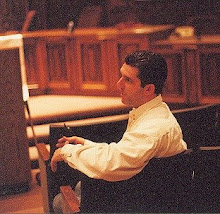I only address this topic because I can't find a lot of good commentary out there about this specific subject. I'm also no great expert; my experience with social media is pretty small compared to the Great Lords of Twitter and the Ancient Kings of Facebook. I confess this.
On the other hand, since according to Mortgage Strategy only 19% of the real-estate industry is even kind of using social media (this from a tweet this morning), and from experience I can testify that 90% of that 19% is using it badly and doing harm to itself, I thought I might at least give my opinions about how social media might be used well in a real-estate context. I am certainly using these tools better than most in my industry, and that has translated into gigs at Zillow and the Daily Herald Newspaper, so apparently my ideas do not entirely suck. T ake them for what they are worth.
ake them for what they are worth.
Here's how I got to writing this:
From Seth Jenson, a really good Realtor in Colorado: "Chris, what do you think about Twitter vs. Facebook? Do you think I need to be on both?"
Seth-
Whoo. What a question.
Facebook is a terrific way for people to connect. I'm no huge FB-er; I have about 400 friends, which is not a big number by any stretch of the imagination. I don't spend a lot of time trying to find friends on FB, or I likely could have a couple hundred more. And maybe I ought to do that. Probably I ought to do that. But it depends on what I'm using Facebook for.
If I'm using Facebook to keep tabs on people I know - my family, my close friends here in town, a few of the guys I went to HS with - then I'm doing it the right way. You can't possibly keep track of the doings of 1000 people every day. Impossible. However, if one of the reasons for you to be on

Facebook is that you want people to remember YOU, well, then you might want a few more friends. You'd want to update your status at least once a day, and probably more than once. These wouldn't all be real-estate updates. In fact, most of them would be about anything except real estate, and would be only for the purpose of strengthening relationships. It is those relationships that bring the referrals that make you successful, and coincidentally, it is those relationships that make your life richer and more rewarding, so that's a happy thing. Facebook makes strengthening those relationships easier than ever, so I would definitely be on Facebook.
Twitter is very different. I love Twitter, myself. I like Twitter better than Facebook. Where I post or comment about 5x a day on Facebook, I do that twice as much - or more - on Twitter. Twitter is a research

tool as much as it is a communications network. I get a lot of my news from Twitter, most of my reading material, and have most of my online conversations there, even more than email. Now, again, it depends on what you're using the tool for. Twitter can be a huge and pointless waste of your time. It can also do you harm, I think. But if you use it with respect, I think it has the potential to be incredibly valuable.
Here are some examples. I am not a big noise on Twitter. I have fewer than 200 followers. I'm following only about 100 people. I determined when I got involved that I wouldn't try to amass a gigantic following until I had some idea what I was doing it for. I didn't know enough about Twitter to know what I was doing, so I figured I'd start by following some people that DID know, namely, those that have good blogs about social media. So I followed
Amber Naslund,
Olivier Blanchard,
Beth Harte, and some others, and learned about what Twitter could do, and more importantly, what I should NOT do on Twitter.
Then I started using the search functions of
TweetDeck - TweetDeck is an indispensable tool for using

Twitter - to follow mortgage news. There were some interesting conversations that came out of that, which resulted in my following
Tyler Osby,
Dan Green, and
Agentopolis and a few others. They are doing most of the blogging and commenting about what's going on in the mortgage industry. There were two or three other topics that I thought would be good (hobbies, etc.) so I started running searches on those as well. I've acquired my 160 or so followers through conversations, not spam. In fact, most of those that are following me would unfollow if I used Twitter to promote myself ad-style. But because I blog, many of them are reading what I write, and following them allows me to read what they write, get smarter, and engage them in conversation. Again, for me it is about the relationships. It's made me better at mortgages, even though I haven't spent a great deal of time on Twitter talking about mortgages per se.
Bottom line? Yes, you should be on Facebook and on Twitter. Figure out what you want these tools to do for you, and design a strategy to get them to do that. Expect it to take time. If you do it right, it will take a lot of it, and a fair amount of work as well. Farming does.
Good luck. Follow me on Twitter @chrisjoneslehi, or find me on Facebook at www.facebook.com/chrisjoneslehi.
Labels: Facebook, Lehi lender, Twitter, Utah mortgage broker, Utah mortgage lender, Utah mortgages, Zillow





